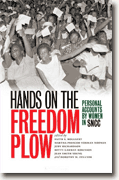Hands on the Freedom Plow
Faith S. Hosaert et al., eds.
book reviews:
· general fiction
· chick lit/romance
· sci-fi/fantasy
· graphic novels
· nonfiction
· audio books
· author interviews
· children's books @
curledupkids.com
· DVD reviews @
curledupdvd.com
newsletter
win books
buy online
links
home
for authors
& publishers
for reviewers

 |
Hands on the Freedom Plow: Personal Accounts by Women in SNCC Faith S. Hosaert, Martha Prescod Norman Noonan, Judy Richardson, Betty Garman Robinson, Jean Smith Young and Dorothy M. Zellner, editors University of Illinois Press Hardcover 656 pages September 2010 |
|
It was pronounced “snick,” and the sound would put a chill in your bones if you were a diehard segregationist; if you were on the fence about civil rights, it was just as nerve-rattling. When SNCC organized a region, it stayed organized. Arguably one of the most notable influences in empowering American blacks and changing the laws of the Southland in the early 1960s, SNCC in its heyday was a force to be reckoned with. And sometimes the reckoning was tough, humiliating, even terrifying – but still the SNCC workers kept coming.
Non-violence meant that, like the followers of Gandhi, SNCC workers would march, would sing, would stand, but would not resist when they were hosed, dragged, shoved, clubbed and trampled. One woman reports: “On a cold afternoon in mid-February 1960, I stood outside Woolworth’s five-and-ten-cent store in downtown Nashville, Tennessee. A group of African American students…had just sat on stools at the store’s lunch counter and asked for service. I didn’t know what to expect, but I was totally unprepared for the strange quiet and then the rush of angry white people from the streets into the store, followed by a swarm of police…I felt sick, sorry, and sad; mostly I wanted to run away. Later I read that the white hecklers had actually put burning cigarettes onto the backs and arms of the students.”The observer states that the SNCC operatives were trained to ignore the heckling and the torment. One SNCC worker remembers that “my darkest hours occurred when fear overcame me. I felt it a lot after the children were born…the best moments were when I felt part of a group in mass meetings in Albany and Birmingham with the crowds, choirs, and organists. The speakers were a stirring, inspiring, uplifting bunch, with Dr. King at the top of the list.”SNCC gradually evolved, with those in charge (notably Stokely Carmichael) making the decision by the late 1960s to oust all the non-black members and focus on black community organizing, to stop trying to effect incremental change in a hostile system, and turn to hard-core political agitation. Its name became the Student National Coordinating Committee and it lost its non-violent credentials, becoming a leading influence in the radical “black power” movement. Comments about this change reflect the sorrow and sense of alienation that many members felt, especially the white participants who had, like their African American counterparts, had a sense of true racial unity within the organization. As expressed by a black member, ”I felt closely connected to the individual white SNCC workers who were also risking their lives and their futures…to this day I don’t know what the logic was that said it was necessary to break off relations with our white associates.” A Jewish woman who grew up feeling the sting of racial prejudice expressed that “as women, both black and white, local or outsiders, we struggled to survive as women always have, by being supportive of each other and handling the problems as they came along…everything we had – our physical and intellectual abilities, our survival skills – were constantly challenged in our effort to build a free new world…we still feel connected. We remain a part of an ongoing struggle we call the Movement.”The publication of Hands on the Freedom Plow Originally published on Curled Up With A Good Book at www.curledup.com. © Barbara Bamberger Scott, 2010 |
|
|
|
 Click here to learn more about this month's sponsor! |
|
| fiction · sf/f · comic books · nonfiction · audio newsletter · free book contest · buy books online review index · links · · authors & publishers reviewers |
|
| site by ELBO Computing Resources, Inc. | |
 The initials at the organization’s inception stood for Student Non-Violent Coordinating Committee. It was composed of men and women, black, white and Latino, who stood together in recognition of the principal that all persons are created equal, and the conviction that to act on that principal was to demonstrate all that was best in America. This is a book of memories of the women of SNCC in that fluent time, when to travel in the South without a Southern birth certificate was tantamount to penetrating a war zone. And it was not only outsiders who joined SNCC. It was noted for its indigenous participation – in Georgia, Alabama, Mississippi, places where freedom riders and freedom workers had disappeared, had died, in the struggle.
The initials at the organization’s inception stood for Student Non-Violent Coordinating Committee. It was composed of men and women, black, white and Latino, who stood together in recognition of the principal that all persons are created equal, and the conviction that to act on that principal was to demonstrate all that was best in America. This is a book of memories of the women of SNCC in that fluent time, when to travel in the South without a Southern birth certificate was tantamount to penetrating a war zone. And it was not only outsiders who joined SNCC. It was noted for its indigenous participation – in Georgia, Alabama, Mississippi, places where freedom riders and freedom workers had disappeared, had died, in the struggle.